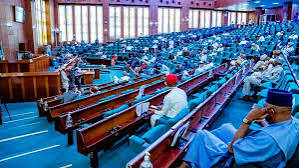The House of Representatives, has held a live interactive session with Nigerians, the first of its kind in the history of the National Assembly, with a promise to have such engagement twice a year.
At the event, the Speaker, of the House of Representatives Mr Abbas Tajudeen, led the leadership and some key members of the House to inform the public on the activities of the parliament from January to December.
Speaker Abbas said henceforth, the House would prioritize “speaking with the people” as against only “speaking for the people.”
The Speaker engaged the citizens in company with the Deputy Speaker, Mr. Benjamin Okezie Kalu; Majority Leader, Prof Julius Ihonvbere; Deputy Majority Leader, Mr. Abdullahi Ibrahim Halims; Minority Leader, Mr. Kingsley Chinda; Chairperson, Commonwealth Women Parliamentarians (CWP), Mr. Zainab Gimba, and Chairman, House Committee on Healthcare Institutions, Mr. Patrick Umoh.
While the legislative year of the National Assembly starts in June, Speaker Abbas noted that the interaction was strategic in December as it marks the first half of the current legislative year. He said the public engagement will continue.
The Speaker stated that the ‘People’s House’ took the remarkable step to further open up the parliament to the people.
Infrastructural bill
The Speaker-led panel of the House also answered sundry questions from the audience. The questions bothered on the economy, security, education, health, youths, and people living with disabilities, among others.

While answering some questions, the Speaker disclosed that 11 percent of the bills sponsored by members of the House in 2024 were on infrastructure.
He, however, noted the limits of the legislature concerning infrastructure. “Implementation (by the Executive) could be another problem,” he said.
Speaker Abbas also stressed the need for the government to shore up revenue.
“For us to expand our infrastructure, we need to expand our revenue base. That is the number one area where we must work. Unless we have enough revenue, we cannot be able to build our infrastructure the way we want,” he said.
More public engagement
On plans to continue the live citizens’ engagement, Speaker Abbas declared that the interaction will hold biannually, with the next coming up in June 2025 when the National Assembly will conclude the current legislative year.
The Speaker recalled how he promised the Nigerian youth at an engagement in July that the House would engage with them twice a year, a promise which has been fulfilled through the two separate town halls held on July 31 and December 16, 2024, respectively.
He said: “We delivered that promise less than a week ago. I want to assure Nigerians that this kind of engagement will be taking place twice in a year.”
Sign language
Members of the panel also informed Nigerians how the House has introduced sign language during plenary to communicate the proceedings of the House to more Nigerians, especially those with hearing difficulties.
While disclosing plans for youth and gender-friendly budgets, the lawmakers assured the audience of more engagements with all stakeholders.
Read Also: House Of Reps Speaker Advocates Youths Empowerment
Media Remains Top Priority For House Of Reps- Speaker
In a remark, former Speaker Patricia Etteh noted that the House has achieved a lot within the last 18 months, saying such achievements should be communicated to Nigerians, especially those in rural communities, in their local languages.
She also encouraged the House to act quickly on its already committed resolve to have more women in governance and leadership positions through the instrument of the law.
For his part, ex-Speaker Dogara, argued that there was the need to have more engagements with the citizens to hear their yearnings and aspirations rather than just speaking for them.
Dogara noted that the citizens remain the cornerstone of democracy, which is why getting their inputs in legislative activities was crucial to sustain of representation.
Emmanuel Ukoh


Comments are closed.